人教版(2019)必修二 Unit 4 History and traditions Reading and Thinking课件(共27张PPT,内镶嵌音频)
文档属性
| 名称 | 人教版(2019)必修二 Unit 4 History and traditions Reading and Thinking课件(共27张PPT,内镶嵌音频) | 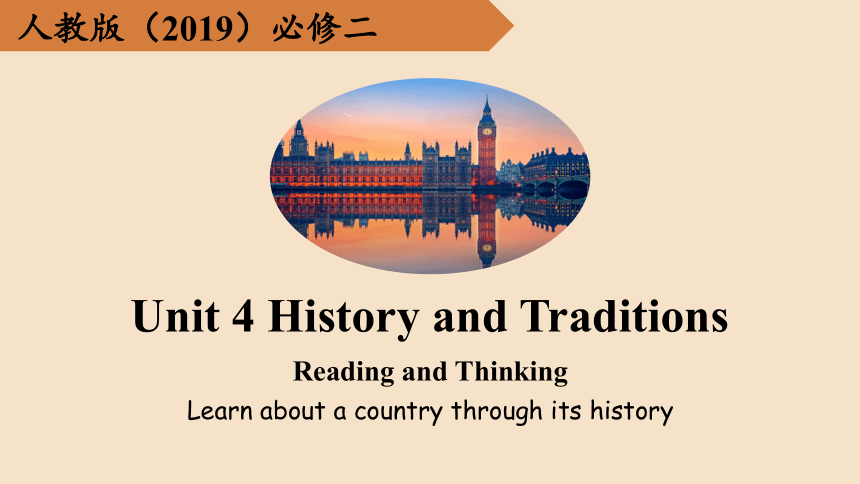 | |
| 格式 | pptx | ||
| 文件大小 | 7.2MB | ||
| 资源类型 | 教案 | ||
| 版本资源 | 人教版(2019) | ||
| 科目 | 英语 | ||
| 更新时间 | 2023-08-09 18:48:46 | ||
图片预览

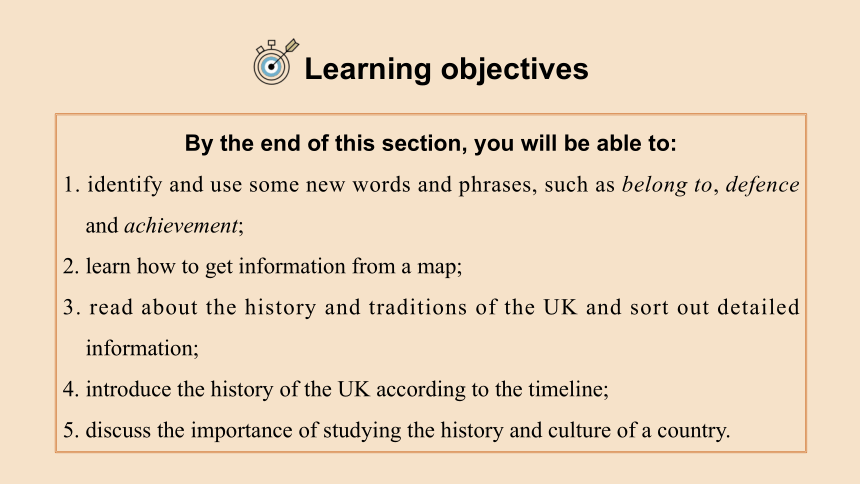
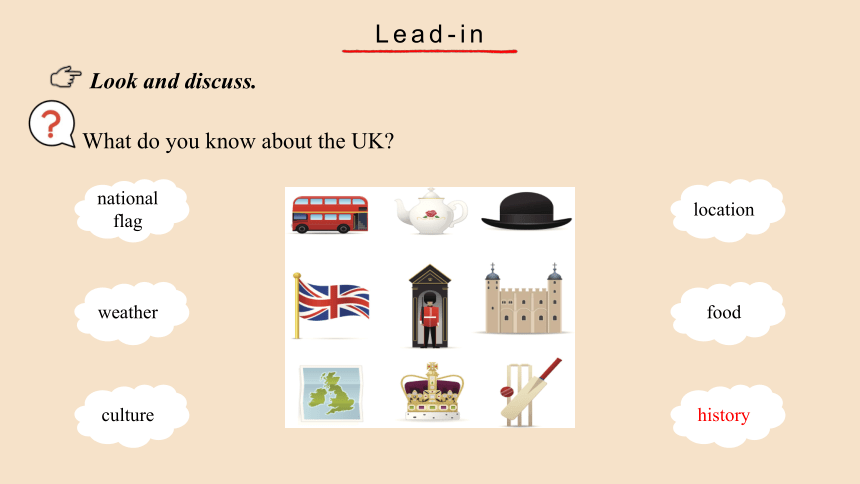
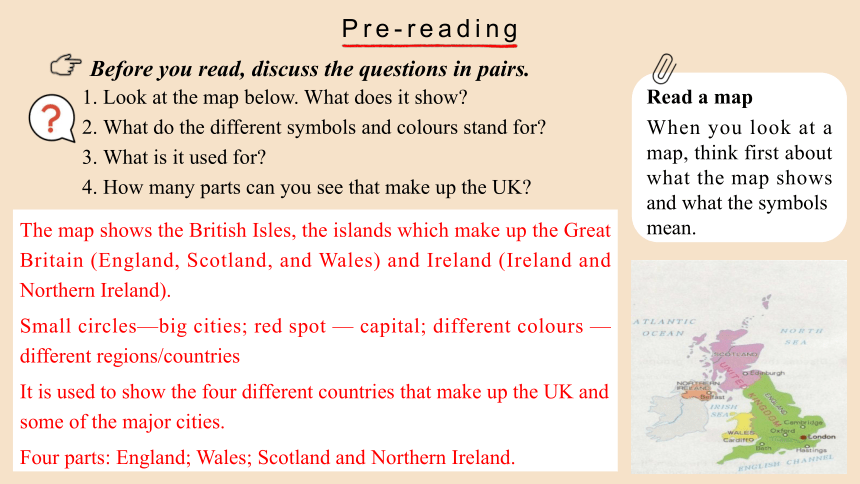
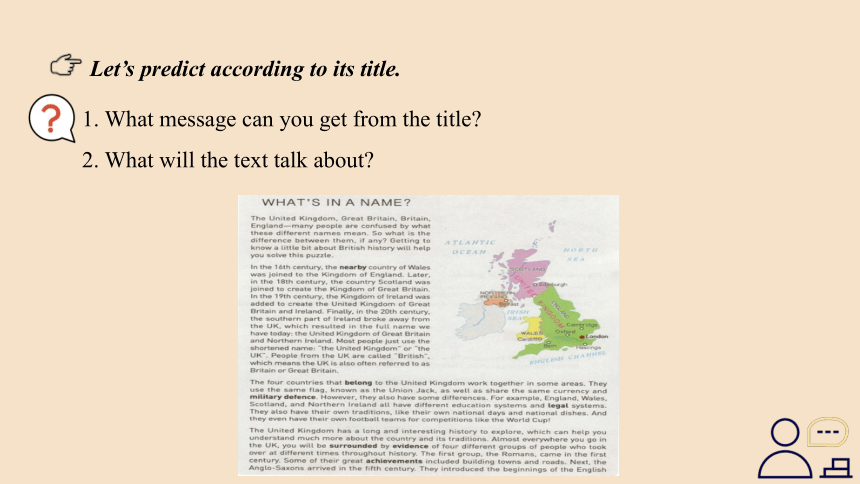
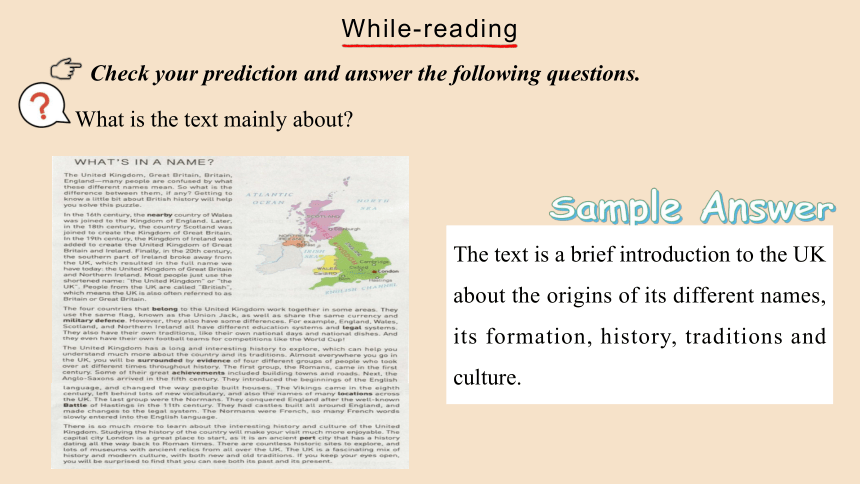
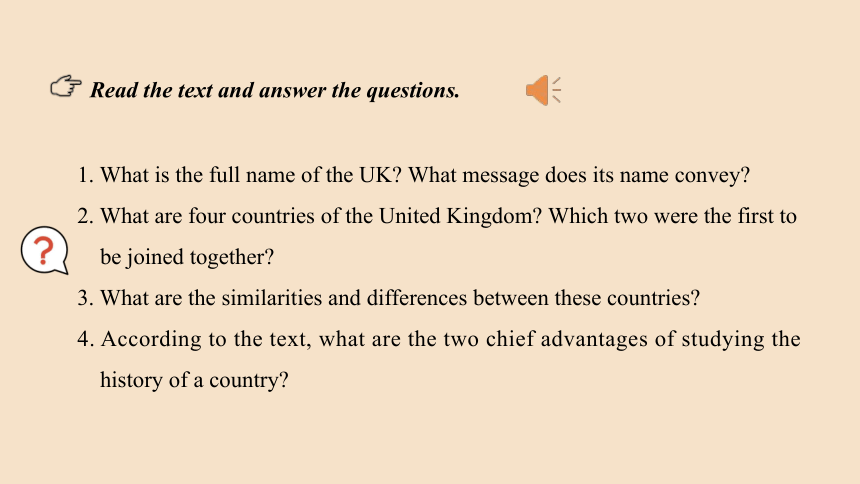
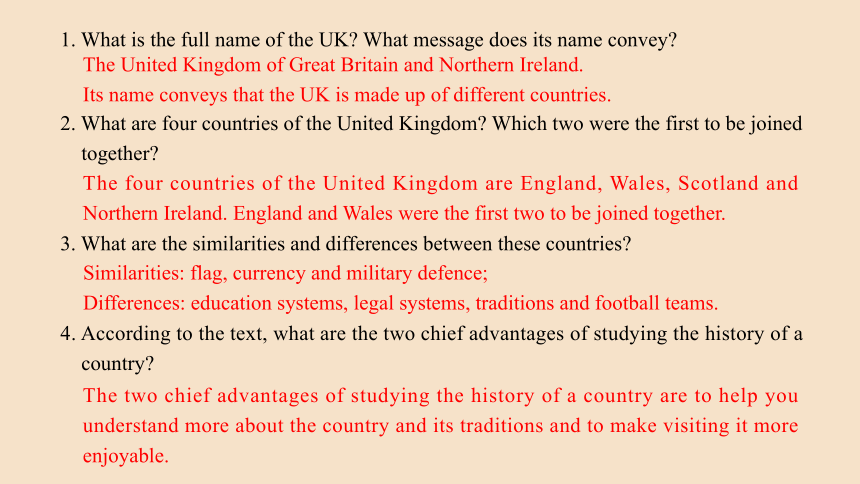
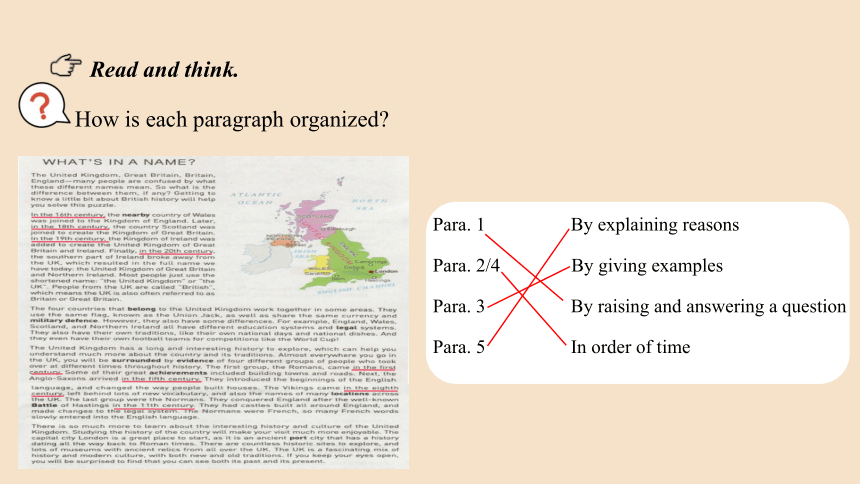
文档简介
(共27张PPT)
人教版(2019)必修二
Unit 4 History and Traditions
Reading and Thinking
Learn about a country through its history
Learning objectives
By the end of this section, you will be able to:
1. identify and use some new words and phrases, such as belong to, defence
and achievement;
2. learn how to get information from a map;
3. read about the history and traditions of the UK and sort out detailed
information;
4. introduce the history of the UK according to the timeline;
5. discuss the importance of studying the history and culture of a country.
Look and discuss.
Lead-in
What do you know about the UK
national flag
location
weather
food
culture
history
Before you read, discuss the questions in pairs.
Pre-reading
1. Look at the map below. What does it show
2. What do the different symbols and colours stand for
3. What is it used for
4. How many parts can you see that make up the UK
Read a map
When you look at a map, think first about what the map shows and what the symbols mean.
The map shows the British Isles, the islands which make up the Great Britain (England, Scotland, and Wales) and Ireland (Ireland and Northern Ireland).
Small circles—big cities; red spot — capital; different colours — different regions/countries
It is used to show the four different countries that make up the UK and some of the major cities.
Four parts: England; Wales; Scotland and Northern Ireland.
Let’s predict according to its title.
1. What message can you get from the title
2. What will the text talk about
Check your prediction and answer the following questions.
What is the text mainly about
While-reading
Sample Answer
The text is a brief introduction to the UK about the origins of its different names, its formation, history, traditions and culture.
Read the text and answer the questions.
1. What is the full name of the UK What message does its name convey
2. What are four countries of the United Kingdom Which two were the first to
be joined together
3. What are the similarities and differences between these countries
4. According to the text, what are the two chief advantages of studying the
history of a country
1. What is the full name of the UK What message does its name convey
2. What are four countries of the United Kingdom Which two were the first to be joined
together
3. What are the similarities and differences between these countries
4. According to the text, what are the two chief advantages of studying the history of a
country
The United Kingdom of Great Britain and Northern Ireland.
Its name conveys that the UK is made up of different countries.
The four countries of the United Kingdom are England, Wales, Scotland and Northern Ireland. England and Wales were the first two to be joined together.
Similarities: flag, currency and military defence;
Differences: education systems, legal systems, traditions and football teams.
The two chief advantages of studying the history of a country are to help you understand more about the country and its traditions and to make visiting it more enjoyable.
Read and think.
How is each paragraph organized
Para. 1 By explaining reasons
Para. 2/4 By giving examples
Para. 3 By raising and answering a question
Para. 5 In order of time
Read again and sort out the information according to the timeline.
When What happened What changed
Romans arrived
Anglo-Saxons came
Vikings came
11th century
16th century
18th century
19th century
20th century
1st century
towns and roads
5th century
language and way houses were built
8th century
vocabulary and names of locations across the UK
Normans conquered England
after the Battle of Hastings
castles built, legal system changed, and new words from French introduced
Wales was joined to Kingdom of England
Scotland was joined to England and Wales
“Kingdom of Great Britain” formed/created
Ireland was added
“United Kingdom of Great Britain and Ireland” formed/created
The southern part of Ireland broke away
name changed to “United Kingdom of Great Britain and Northern Ireland”
Let’s introduce the history of the UK according to the timeline.
Post-reading
1st century
5th century
8th century
11th century
16th century
18th century
19th century
20th century
Complete the conversation about the UK using the phrases in their correct forms.
as well as belong to add to join to break away keep your eyes open
A: I can never remember what the UK means! There’s England, Britain, _____________ Great Britain!
B: Well, it helps if you remember that there are four countries that ____________ the UK. That’s why it’s called the United Kingdom.
A: Four countries I must have been asleep in that part of our history class! So the first country was England, and the others were ___________ that
B: Yes, right. First England, then Wales, then Scotland. The last country was Ireland, but later the southern half didn’t want to be ___________ the United Kingdom.
A: Oh, I remember now! The southern part ______________ from Northern Ireland, right
B: Yes, you got it well remembered! But ___________________ in history class next time!
as well as
belong to
added to
joined to
broke away
keep your eyes open
Discuss the questions in groups.
1. Why is it important to study the history and culture of a country before
visiting it
2. What important things should visitors know about before they come to China
Studying a country’s history and culture before visiting it is important because it will help you understand the place better and have a more enjoyable experience. You will be able to interact better with the people and their culture and have a richer experience.
Visitors to China should know something about the history of the country and about the cultural traditions of the area being visited, such as the food eaten, or festivals celebrated there.
Sample Answer
Words and Expressions
The four countries that belong to the United Kingdom work together in some areas.
(P40)
同属于联合王国的这四个国家在某些领域紧密合作。
belong /b 'l / vi. 应在(某处);适应
搭配
belong to 属于(belong to无被动语态和进行时态;可用 belong to 的现在分词形式作后置定语。)
例句
It is a good habit to lay things where they belong.
把东西放在应该放的地方是个好习惯。
Professor Williams keeps telling his students that the future belongs to the creative.
威廉姆斯教授不断告诉他的学生未来属于有创造力的人。
The four countries that belong to the United Kingdom work together in some areas.
(P40)
同属于联合王国的这四个国家在某些领域紧密合作。
belong /b 'l / vi. 应在(某处);适应
拓展
belonging n. [U]归属 a sense of belonging 归属感
belongings n. [pl.]所有物;财物
When I was back to China, I felt a strong sense of belonging.
当我回到中国时,我有一种强烈的归属感。
Having sold most of his belongings, he almost had nothing left in the house.
他已经卖掉了大部分财物,房子里几乎什么都没有留下。
They use the same flag, known as the Union Jack, as well as share the same currency
and military defence. (P40)
像拥有同样的货币和国防一样,他们也使用同一面国旗。
defence /d 'fens/ n. 防御;保卫
搭配
in defence 保卫,防守 in defence of ... 为了保卫……
in sb.’s defence/in defence of sb./come to sb.’s defence 为某人辩护
例句
We shouldn’t forget the soldiers who died in defence of our country.
我们不应该忘记那些为保卫祖国而献身的战士。
I have to say in her defence that she knew nothing about it beforehand.
我得为她说句话,她事先并不知道此事。
They use the same flag, known as the Union Jack, as well as share the same currency
and military defence. (P40)
像拥有同样的货币和国防一样,他们也使用同一面国旗。
defence /d 'fens/ n. 防御;保卫
拓展
defence n. [C,U]防御物,防务,防御能力 defence against... 对……的防御
defend vt. & vi. 防御,保护;vt. 辩解,辩白
defend sb./sth. from/against ... 保卫……免受……
defend sb. from/against ... 针对……为某人辩解
defensive adj. 防御的,保护的,保卫的
A good diet helps build the body’s natural defences.
良好的饮食有助于增强身体的自然抵抗能力。
Some of their great achievements included building towns and roads. (P40)
罗马人的伟大成就在于他们建立了城镇、修建了道路。
achievement / 't i:vm nt/ n. 成就;成绩;达到
搭配
make an achievement/achievements (in ...) (在……方面)取得成就
a sense of achievement 成就感
例句
If you can learn to see the good things about yourself — your individuality, your value to others, your achievements — you will soon begin to love yourself just the way you are.
如果你能学会看到自己的优点——你的个性、你对他人的价值、你的成就——
你很快就会开始爱上自己本来的样子。
Some of their great achievements included building towns and roads. (P40)
罗马人的伟大成就在于他们建立了城镇、修建了道路。
achievement / 't i:vm nt/ n. 成就;成绩;达到
拓展
achieve vt. 达到;完成 achieve success/progress 取得成功/进步
achieve one’s goal/dream 实现某人的目标/梦想
achiever n. [C]成功者;取得……成绩的人 a low achiever 成绩平庸的人
I’ve achieved only half of what I hoped, so I don’t think I am an achiever and I won’t celebrate the achievements I’ve made, although my parents think I should have a sense of achievement.
我只完成了原本希望的一半,因此我认为我不是一个成功者,也不会庆祝自己
所取得的成绩,尽管我父母认为我应该有一种成就感。
If you keep your eyes open, you will be surprised to find that you can see both its past
and its present. (P41)
用心去观察,英国的过去与现在都将展示在你面前,令你叹为观止。
keep your eyes open (for) 留心;留意
例句
If you keep your eyes open, you can learn a great deal when traveling.
如果你留心的话,你能在旅行中学到很多。
Please keep your eyes open for opportunities, for they wait for no one.
请留意寻找机会,因为它们不会等待任何人。
拓展
catch one’s eye 引起某人注意 fix/keep one’s eyes on 注视,盯着看
have an eye for ... 对……有鉴赏力(或识别力、眼力)
If you keep your eyes open, you will be surprised to find that you can see both its past
and its present. (P41)
用心去观察,英国的过去与现在都将展示在你面前,令你叹为观止。
keep your eyes open (for) 留心;留意
拓展
in one’s eyes 依某人看,在某人眼里 keep an eye on 照看,留神,留意
look sb. in the eye(s) 直视某人,正视某人
例句
Linda is a fashionable young girl; she has an eye for fashion.
琳达是一个时髦的年轻女孩;她对时尚很有眼光。
I was doing my homework when a bird caught my eye.
我正在做作业,这时一只鸟引起了我的注意。
Grammar
So what is the difference between them, if any (P40)
那么,如果这些名称有区别的话,区别何在?
解析
if any是一个省略的状语从句,补充完整为if there is any difference。在if引导的条件状语从句中,有时可以省略从句的主谓语it is/was,有时可省略从句中的there be或省略与前句相同的部分,在这类省略结构中有的已构成固定结构,这类结构常见的有:
if+so/not:if so 如果这样;if not 不然
if+形容词:if necessary 如果有必要;if possible 如果有可能
if+代词:if any 如果有的话;即使有……也不(主句为否定意义)
if ever:如果曾经;即使……也不(与表示否定意义的词语连用)
So what is the difference between them, if any (P40)
那么,如果这些名称有区别的话,区别何在?
例句
If so, you might already understand why UNESCO is fighting to preserve sites of cultural and natural importance to mankind.
如果是这样,你们也许已经明白为什么联合国教科文组织正在竭力保护对人类
具有文化和自然重要性的遗址。
If I can find the book here, it will be great, but if not, I will buy a new one.
如果我在这儿能找到这本书,那就太棒了;但是如果找不到,我会买本新的。
If (it is) necessary, you can ring me and I will come in no time.
如果有必要,你可以给我打电话,我会马上就到的。
So what is the difference between them, if any (P40)
那么,如果这些名称有区别的话,区别何在?
拓展
在引导的条件状语从句中,如果从句的主语和主句的主语一致,同时从句谓语含有be动词,则可省略该从句的主语和be动词,这时从句有以下常见结构:if+现在分词/if+过去分词。
If (you are) traveling north, you must change in Moscow.
你如果向北旅行,必须在莫斯科换乘。
Experts warn that medical waste from hospitals, if (it is) not handled properly, may lead to the spread of diseases.
专家警告说,医院的医疗垃圾如果处理不当,可能会导致疾病的传播。
Read the text aloud.
Write a short passage to introduce the history of the UK with the help of the timeline.
Homework
人教版(2019)必修二
Unit 4 History and Traditions
Reading and Thinking
Learn about a country through its history
Learning objectives
By the end of this section, you will be able to:
1. identify and use some new words and phrases, such as belong to, defence
and achievement;
2. learn how to get information from a map;
3. read about the history and traditions of the UK and sort out detailed
information;
4. introduce the history of the UK according to the timeline;
5. discuss the importance of studying the history and culture of a country.
Look and discuss.
Lead-in
What do you know about the UK
national flag
location
weather
food
culture
history
Before you read, discuss the questions in pairs.
Pre-reading
1. Look at the map below. What does it show
2. What do the different symbols and colours stand for
3. What is it used for
4. How many parts can you see that make up the UK
Read a map
When you look at a map, think first about what the map shows and what the symbols mean.
The map shows the British Isles, the islands which make up the Great Britain (England, Scotland, and Wales) and Ireland (Ireland and Northern Ireland).
Small circles—big cities; red spot — capital; different colours — different regions/countries
It is used to show the four different countries that make up the UK and some of the major cities.
Four parts: England; Wales; Scotland and Northern Ireland.
Let’s predict according to its title.
1. What message can you get from the title
2. What will the text talk about
Check your prediction and answer the following questions.
What is the text mainly about
While-reading
Sample Answer
The text is a brief introduction to the UK about the origins of its different names, its formation, history, traditions and culture.
Read the text and answer the questions.
1. What is the full name of the UK What message does its name convey
2. What are four countries of the United Kingdom Which two were the first to
be joined together
3. What are the similarities and differences between these countries
4. According to the text, what are the two chief advantages of studying the
history of a country
1. What is the full name of the UK What message does its name convey
2. What are four countries of the United Kingdom Which two were the first to be joined
together
3. What are the similarities and differences between these countries
4. According to the text, what are the two chief advantages of studying the history of a
country
The United Kingdom of Great Britain and Northern Ireland.
Its name conveys that the UK is made up of different countries.
The four countries of the United Kingdom are England, Wales, Scotland and Northern Ireland. England and Wales were the first two to be joined together.
Similarities: flag, currency and military defence;
Differences: education systems, legal systems, traditions and football teams.
The two chief advantages of studying the history of a country are to help you understand more about the country and its traditions and to make visiting it more enjoyable.
Read and think.
How is each paragraph organized
Para. 1 By explaining reasons
Para. 2/4 By giving examples
Para. 3 By raising and answering a question
Para. 5 In order of time
Read again and sort out the information according to the timeline.
When What happened What changed
Romans arrived
Anglo-Saxons came
Vikings came
11th century
16th century
18th century
19th century
20th century
1st century
towns and roads
5th century
language and way houses were built
8th century
vocabulary and names of locations across the UK
Normans conquered England
after the Battle of Hastings
castles built, legal system changed, and new words from French introduced
Wales was joined to Kingdom of England
Scotland was joined to England and Wales
“Kingdom of Great Britain” formed/created
Ireland was added
“United Kingdom of Great Britain and Ireland” formed/created
The southern part of Ireland broke away
name changed to “United Kingdom of Great Britain and Northern Ireland”
Let’s introduce the history of the UK according to the timeline.
Post-reading
1st century
5th century
8th century
11th century
16th century
18th century
19th century
20th century
Complete the conversation about the UK using the phrases in their correct forms.
as well as belong to add to join to break away keep your eyes open
A: I can never remember what the UK means! There’s England, Britain, _____________ Great Britain!
B: Well, it helps if you remember that there are four countries that ____________ the UK. That’s why it’s called the United Kingdom.
A: Four countries I must have been asleep in that part of our history class! So the first country was England, and the others were ___________ that
B: Yes, right. First England, then Wales, then Scotland. The last country was Ireland, but later the southern half didn’t want to be ___________ the United Kingdom.
A: Oh, I remember now! The southern part ______________ from Northern Ireland, right
B: Yes, you got it well remembered! But ___________________ in history class next time!
as well as
belong to
added to
joined to
broke away
keep your eyes open
Discuss the questions in groups.
1. Why is it important to study the history and culture of a country before
visiting it
2. What important things should visitors know about before they come to China
Studying a country’s history and culture before visiting it is important because it will help you understand the place better and have a more enjoyable experience. You will be able to interact better with the people and their culture and have a richer experience.
Visitors to China should know something about the history of the country and about the cultural traditions of the area being visited, such as the food eaten, or festivals celebrated there.
Sample Answer
Words and Expressions
The four countries that belong to the United Kingdom work together in some areas.
(P40)
同属于联合王国的这四个国家在某些领域紧密合作。
belong /b 'l / vi. 应在(某处);适应
搭配
belong to 属于(belong to无被动语态和进行时态;可用 belong to 的现在分词形式作后置定语。)
例句
It is a good habit to lay things where they belong.
把东西放在应该放的地方是个好习惯。
Professor Williams keeps telling his students that the future belongs to the creative.
威廉姆斯教授不断告诉他的学生未来属于有创造力的人。
The four countries that belong to the United Kingdom work together in some areas.
(P40)
同属于联合王国的这四个国家在某些领域紧密合作。
belong /b 'l / vi. 应在(某处);适应
拓展
belonging n. [U]归属 a sense of belonging 归属感
belongings n. [pl.]所有物;财物
When I was back to China, I felt a strong sense of belonging.
当我回到中国时,我有一种强烈的归属感。
Having sold most of his belongings, he almost had nothing left in the house.
他已经卖掉了大部分财物,房子里几乎什么都没有留下。
They use the same flag, known as the Union Jack, as well as share the same currency
and military defence. (P40)
像拥有同样的货币和国防一样,他们也使用同一面国旗。
defence /d 'fens/ n. 防御;保卫
搭配
in defence 保卫,防守 in defence of ... 为了保卫……
in sb.’s defence/in defence of sb./come to sb.’s defence 为某人辩护
例句
We shouldn’t forget the soldiers who died in defence of our country.
我们不应该忘记那些为保卫祖国而献身的战士。
I have to say in her defence that she knew nothing about it beforehand.
我得为她说句话,她事先并不知道此事。
They use the same flag, known as the Union Jack, as well as share the same currency
and military defence. (P40)
像拥有同样的货币和国防一样,他们也使用同一面国旗。
defence /d 'fens/ n. 防御;保卫
拓展
defence n. [C,U]防御物,防务,防御能力 defence against... 对……的防御
defend vt. & vi. 防御,保护;vt. 辩解,辩白
defend sb./sth. from/against ... 保卫……免受……
defend sb. from/against ... 针对……为某人辩解
defensive adj. 防御的,保护的,保卫的
A good diet helps build the body’s natural defences.
良好的饮食有助于增强身体的自然抵抗能力。
Some of their great achievements included building towns and roads. (P40)
罗马人的伟大成就在于他们建立了城镇、修建了道路。
achievement / 't i:vm nt/ n. 成就;成绩;达到
搭配
make an achievement/achievements (in ...) (在……方面)取得成就
a sense of achievement 成就感
例句
If you can learn to see the good things about yourself — your individuality, your value to others, your achievements — you will soon begin to love yourself just the way you are.
如果你能学会看到自己的优点——你的个性、你对他人的价值、你的成就——
你很快就会开始爱上自己本来的样子。
Some of their great achievements included building towns and roads. (P40)
罗马人的伟大成就在于他们建立了城镇、修建了道路。
achievement / 't i:vm nt/ n. 成就;成绩;达到
拓展
achieve vt. 达到;完成 achieve success/progress 取得成功/进步
achieve one’s goal/dream 实现某人的目标/梦想
achiever n. [C]成功者;取得……成绩的人 a low achiever 成绩平庸的人
I’ve achieved only half of what I hoped, so I don’t think I am an achiever and I won’t celebrate the achievements I’ve made, although my parents think I should have a sense of achievement.
我只完成了原本希望的一半,因此我认为我不是一个成功者,也不会庆祝自己
所取得的成绩,尽管我父母认为我应该有一种成就感。
If you keep your eyes open, you will be surprised to find that you can see both its past
and its present. (P41)
用心去观察,英国的过去与现在都将展示在你面前,令你叹为观止。
keep your eyes open (for) 留心;留意
例句
If you keep your eyes open, you can learn a great deal when traveling.
如果你留心的话,你能在旅行中学到很多。
Please keep your eyes open for opportunities, for they wait for no one.
请留意寻找机会,因为它们不会等待任何人。
拓展
catch one’s eye 引起某人注意 fix/keep one’s eyes on 注视,盯着看
have an eye for ... 对……有鉴赏力(或识别力、眼力)
If you keep your eyes open, you will be surprised to find that you can see both its past
and its present. (P41)
用心去观察,英国的过去与现在都将展示在你面前,令你叹为观止。
keep your eyes open (for) 留心;留意
拓展
in one’s eyes 依某人看,在某人眼里 keep an eye on 照看,留神,留意
look sb. in the eye(s) 直视某人,正视某人
例句
Linda is a fashionable young girl; she has an eye for fashion.
琳达是一个时髦的年轻女孩;她对时尚很有眼光。
I was doing my homework when a bird caught my eye.
我正在做作业,这时一只鸟引起了我的注意。
Grammar
So what is the difference between them, if any (P40)
那么,如果这些名称有区别的话,区别何在?
解析
if any是一个省略的状语从句,补充完整为if there is any difference。在if引导的条件状语从句中,有时可以省略从句的主谓语it is/was,有时可省略从句中的there be或省略与前句相同的部分,在这类省略结构中有的已构成固定结构,这类结构常见的有:
if+so/not:if so 如果这样;if not 不然
if+形容词:if necessary 如果有必要;if possible 如果有可能
if+代词:if any 如果有的话;即使有……也不(主句为否定意义)
if ever:如果曾经;即使……也不(与表示否定意义的词语连用)
So what is the difference between them, if any (P40)
那么,如果这些名称有区别的话,区别何在?
例句
If so, you might already understand why UNESCO is fighting to preserve sites of cultural and natural importance to mankind.
如果是这样,你们也许已经明白为什么联合国教科文组织正在竭力保护对人类
具有文化和自然重要性的遗址。
If I can find the book here, it will be great, but if not, I will buy a new one.
如果我在这儿能找到这本书,那就太棒了;但是如果找不到,我会买本新的。
If (it is) necessary, you can ring me and I will come in no time.
如果有必要,你可以给我打电话,我会马上就到的。
So what is the difference between them, if any (P40)
那么,如果这些名称有区别的话,区别何在?
拓展
在引导的条件状语从句中,如果从句的主语和主句的主语一致,同时从句谓语含有be动词,则可省略该从句的主语和be动词,这时从句有以下常见结构:if+现在分词/if+过去分词。
If (you are) traveling north, you must change in Moscow.
你如果向北旅行,必须在莫斯科换乘。
Experts warn that medical waste from hospitals, if (it is) not handled properly, may lead to the spread of diseases.
专家警告说,医院的医疗垃圾如果处理不当,可能会导致疾病的传播。
Read the text aloud.
Write a short passage to introduce the history of the UK with the help of the timeline.
Homework
